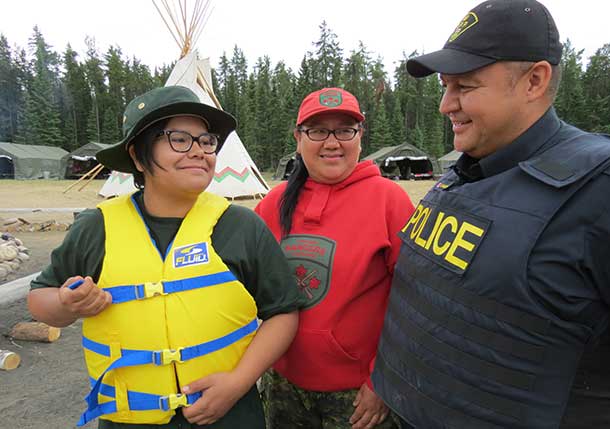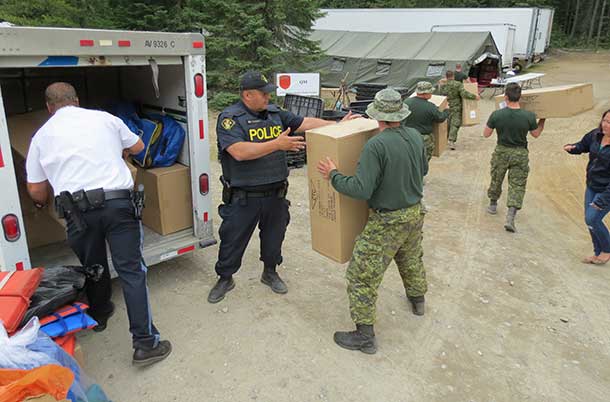
GERALDTON – NEWS – There are few life jackets in the First Nations of the Far North of Ontario, an area with the highest number of aboriginal drowning deaths of any part of Canada.
But thanks to the personal efforts of an Ontario Provincial Police officer almost 150 Junior Canadian Rangers from 19 remote First Nations will take a life jacket home with them at the end of Camp Loon, a training camp they are attending in the bush near Geraldton.
“I’ve been to close to 15 to 20 drowning deaths in almost 17 years with the OPP,” said Sergeant Marty Singleton. “That’s about one a year. In every drowning I’ve been to the common cause was no one was wearing a life jacket.”
Many of the First Nations of the North are poor and money is a factor when feeding s a family is often a higher priority than buying a life jacket, even though travelling by water is a part of daily life and drownings are frequent occurrences.
When two of Singleton’s friends drowned they were not wearing a life jacket.
So Singleton, a member of the Eagle Lake First Nation near Dryden, embarked on a personal campaign, with the support of the OPP, to collect 1,000 life jackets through donations and get them into the Far North. He has collected almost half his target but getting the jackets into the remote Northern communities without road access is often a bigger challenge.
Then he heard about Camp Loon and the 149 Junior Rangers from 19 First Nations who are at it. They are part of a national Canadian Army program for boys and girls aged 12 to 18 in remote communities across the Canadian North. The program emphasizes safety on the land and water and in personal life styles.

“I couldn’t ask for a better opportunity to reach out to nearly 150 kids from communities up North and give each of them a life jacket to take it home with them,” Singleton said. “A life jacket is designed for one thing – to save a life and they do.”
Captain Caryl Fletcher, the Canadian Army officer who is Camp Loon’s commandant, said the only time he sees a life jacket when he visits First Nations in the Far North is when they are army life jackets used by Canadian Rangers. “Marty’s project is a phenomenal idea,” he said. “We’re very grateful for what he has done. Each Junior Ranger will take a jacket home and I know it will be used, because they learn here in the camp about the importance of wearing one.”
Eight of the life jackets will go to Fort Albany when eight Junior Rangers from the Cree community on the James Bay coast fly home, said Ranger Jessie Sutherland.
“Historically we’ve never used life jackets in Fort Albany,” she said, “and we’ve had boating accidents where there were drownings. In every case there was no life jacket. Food has always been the biggest factor when it came to feeding your family and life jackets cost money. It’s only recently that we’ve learned about water safety, through the Canadian Ranger and Junior Ranger programs or when our people go south and learn about it.
“The life jackets our Junior Rangers are going to take home with them from Camp Loon will be used and when people see them they will spread the message about the need to wear one.”
(Sergeant Peter Moon is the public affairs ranger for 3rd Canadian Ranger Patrol Group at Canadian Forces Base Borden.)





